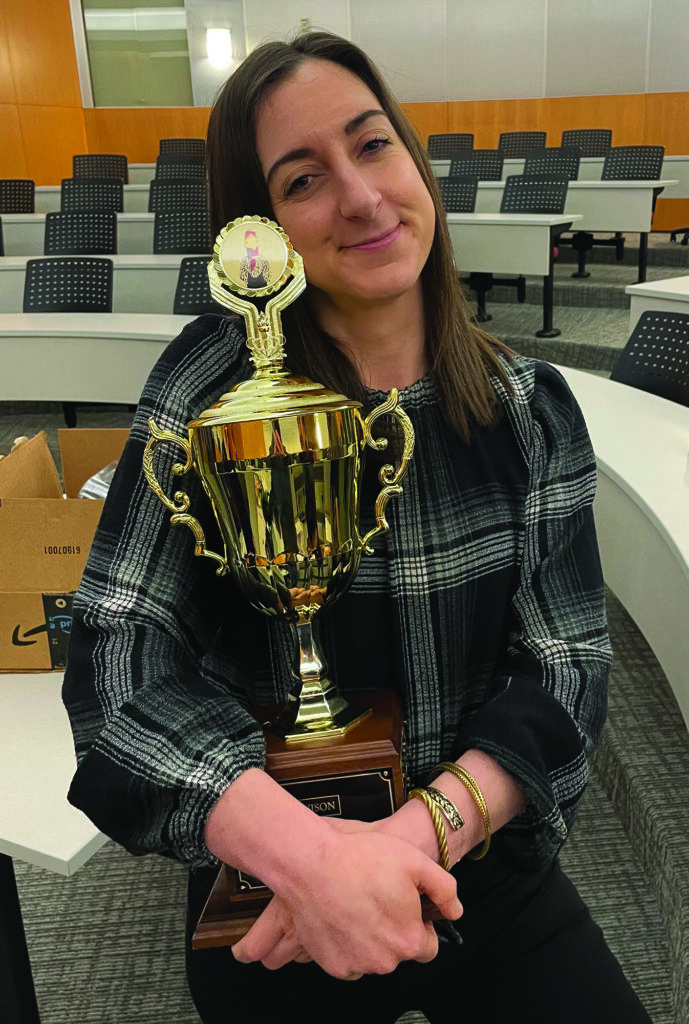Addy Pittenger, Arts & Life Editor Emeritus,
With the annual Podcast-a-thon entering its sixth year as a Denison Journalism Department event, numerous faculty members from across Denison’s academic departments have added Podcast-a-thon as a main project for their relative semester courses. Journalism faculty member Doug Swift, one of the leading creators of Podcast-a-thon, has been one of the main leaders in expanding the event to all of Denison’s campus.
Originally, the journalism department was a Narrative Journalism concentration; however, it was in popular demand by the students to become an official major. With Swift, along with the rest of the journalism department, the major was introduced in the spring of 2022 to coincide with Podcast-a-thon.
“The students really liked what we were doing and wanted more. It was hard to stay small… there was just too much upward pressure to not grow and develop it at Denison,” Swift explains.
Swift also mentioned how the students wanted to expand their interests from just writing to documentary filmmaking, podcasts, reporting and other forms of multimedia storytelling. Podcast-a-thon fits perfectly into those interests.
Podcast-a-thon was a part of the Narrative Journalism concentration when Denison was offered a Mellon Foundation grant to “spur writing across the curriculum… to invite people across the curriculum to learn narrative [writing],” Swift adds.
Swift layed out what he calls “the three guidelines” within the judging of Podcast-a-thon: the first being to think about what the professors’ goals were [for the podcasts], the second being rating the podcasts on the basis of being a compelling story and the third being the quality of the podcast overall.
As Podcast-a-thon continued to grow, Swift’s invitation expanded to not just the Journalism department, but to other professors in the English, Biology, Economics, Politics & Public Affairs and Environmental Studies departments as well to participate in Podcast-a-thon.
For the second time, Professor Heather Rhodes in the Biology Department has her students participating in Podcast-a-thon. In her neuroscience senior seminar, Rhodes believes that having her students participate would be a good opportunity to have her students engage in science communication.
“I was looking to update and make some changes to the seminar, so when I got the email from Doug Swift, I thought it would be a good way to have students reach audiences in both non-scientific and scientific fields,” Rhodes adds.
Rhodes places emphasis on the importance of scientific communication. In other words, the importance of making science more universally accessible to the entire public.
Julia Dasbach in the English Department is a new professor to Denison, and she as well was thrilled at the opportunity to have her students participate in Podcast-a-thon. With one of her classes she teaches being called “Re-presenting The Holocaust,” she wanted Podcast-a-thon to be a great way to tell stories from the Holocaust in a way that she shares as, “going beyond just the space of the page.”
“With the subject matter [in our class], survival testimonies were first recorded and documented through audio and video, and so [Podcast-a-thon] seemed really in conversation with the material we were going to be looking at. The audio medium is a way of bearing witness,” Dasbach exclaims.
Dasbach structured the course to build around Podcast-a-thon. In her class, Dasbach is having her students choose a person, place, or artifact to tell the story of the chosen topic.
“The more we are able to be multidisciplinary, interdisciplinary, cross-disciplinary, the better. It allows other departments and fields to see the value of telling stories and the value of something that is inherently creative,” Dasbach said.
Alan Miller in the Journalism Department is eager to have the Podcast-a-thon trophy in his office. He values the idea of using the Podcast-a-thon to help students see the value in telling stories in all of their relative forms.

Miller’s class, “Doing Journalism With Ethics and Empathy” incorporates the Podcast-a-thon as coursework. Students are assigned to reach out to journalists that have encountered ethical issues.
“Hopefully by hearing these problems, the journalists of the future who are in my class right now will understand ‘this is something I need to watch for,’” Miller said.
Podcast-a-thon allows students to use skills and ideas learned in their own majors to put together projects and tell stories.
For Swift, he loves hearing students’ voices come through when given opportunities like Podcast-a-thon. He asked President Weinberg, “how important do you think it is for students to find their voice?” To which Weinberg replied, “it is just the most important thing that there is—personally, civically and professionally.”
Podcast-a-thon is open to any students who decide to participate. The event has a community category which is open to independent student submissions. The Podcast-a-thon award ceremony will take place during the first week of March where class submissions will be shown, and the winner from the faculty member’s relative class will receive the “Buzzy Award.”
